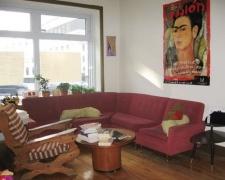On Sep 24, The 2110 Centre for Gender Advocacy is sponsoring a bike tour.
Instead of heading to the usual tourist traps, though, organizers Kate Lamothe and Telyn Kusalik will lead cyclists to locations around Montreal that are, or have been, important to the trans community. The idea is to raise awareness about the past and present struggles that trans people face and to highlight the intersections of trans identity with sex work, poverty, seropositivity and queerness.
“With this tour,” says Lamothe, “we’re trying to really make people think about how institutions can directly influence people’s lives and how changing policies within institutions can have a drastic affect on the lives of trans people.”
The tour starts at the 2110 Centre For Gender Advocacy, a place that has historically had a lot of involvement from trans men. In addition to a binder program, where trans men can buy otherwise expensive chest-binders at cost, the 2110 has a needle exchange program for intra-muscular needles and provides referrals to trans positive doctors.
“They’ve done a lot for the trans male community,” Lamothe says. “We wanted to bring that to light right at the beginning. The rest of the tour is gonna be pretty trans-female specific because trans men still face incredible amounts of invisibilization… It’s easier to advocate and call for change when you are at least visible. Trans male communities have been a lot more word of mouth and not as institutional.”
Cyclists will get a different kind of history lesson at the former PJs bar, one of six stops on the tour.
“PJs bar is now a parking lot,” Lamothe laughs. “It’s right next to what’s now Carlos & Pepe’s, and that used to be Tropical Lounge.” Tropical, incidentally, was the first gay bar in Montreal to allow men to dance with each other, which before 1969 was against the law.
Lamothe has more historical tidbits. “In the 1950s and ’60s, if you were caught by the police ‘cross-dressed’ you had to have at least three articles of clothing of your birth sex on you,” she marvels. “Otherwise you could be thrown in jail or ticketed.”
“Jean Drapeau did massive raids of all the gay bars, all the trans bars, all the street-based prostitutes,” Lamothe says. “He moved everyone east and that’s why PJs closed in ’74, and Cafe Cleopatre opened a little bit further east in ’75.”
The tour concludes at Stella, an organization that provides resources for sex workers and has been very inclusive of trans women.
“A couple of years after Stella started, they were approached by a group of trans women who said, ‘Listen, we need to have access to this service as well. It would be really great if you allowed us to come to the medical clinics that you run, and provide services to benefit our community.’
“Stella actually took that into account, and now all their documents say that they’re a space for both transsexual and cis women as well as transvestite women and a whole bunch of other trans women which is really, really amazing. It shows a pretty strong example of a women’s organization that was approached by a group of trans women and they actually embraced them instead of shunning them.”
Participants will learn more about these locations as well as Cafe Cleopatre, Cactus and Citibar.
“You don’t have to be a student and you don’t have to be trans-identified,” Lamothe asserts. “This tour is for anyone!”
The TRANStory bike tour begins at the 2110 Centre for Gender Advocacy (2110 Rue Mackay) at 3pm sharp on Sep 24. See Centre2110.org.

 Why you can trust Xtra
Why you can trust Xtra


